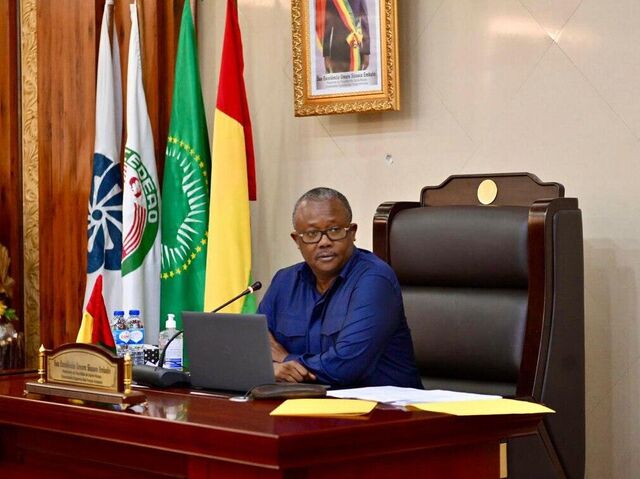
Guinea-Bissau has unveiled its new government, appointing 26 ministers and 11 secretaries of state, in a move that largely maintains continuity with the previous cabinet.
Businessman and politician Braima Camará has been named the new head of government, succeeding Prime Minister Rui Duarte de Barros.
Announced on Sunday, the reshuffle includes many familiar faces who held key positions in the prior administration. Carlos Pinto Pereira continues to lead the Ministry of Foreign Affairs, while Dionísio Cabi remains at the helm of National Defense.
Botche Candé keeps his post overseeing the Ministry of the Interior and Public Order, with Ilídio Vieira Té maintaining control of the Finance Ministry. Soares Sambú remains responsible for the Ministry of Economy and Regional Integration.
Retired judge Maria do Céu Monteiro stays in charge of the Ministry of Justice and Human Rights, while environmental engineer Viriato Soares Cassamá retains his role heading the Ministry of Environment, Biodiversity and Climate Action.
The government has introduced a handful of new ministers: Abel da Silva replaces Mário Musante da Silva Loureiro as Minister of Fisheries, Júlio Balde takes over the Ministry of Telecommunications and Digital Economy, and Queba Djaite assumes leadership of the Ministry of National Education, Higher Education and Scientific Research, succeeding Henry Mané.
Augusto da Silva, formerly Minister of Youth, Culture and Sports, now heads the Ministry of Health, a position previously held by Pedro Tipote. Secuna Baldé has joined as Minister of Tourism and Crafts, replacing Alberto Demba Turé. Former Public Works Minister Fidelis Forbs returns to government to lead the Ministry of Energy, while Alfredo Malu steps in as Minister of Culture, Youth and Sports.
The new government will be sworn in Monday at 4 p.m. at the presidential palace in Bissau before President Umaro Sissoco Embaló.
Full list of ministers:
-
Soares Sambú – Economy, Planning and Regional Integration
-
Botche Candé – Interior and Public Order
-
Marciano Silva Barber – Transport
-
Malal Sané – Presidency of the Council of Ministers and Parliamentary Affairs
-
Maria do Céu Silva Monteiro – Justice and Human Rights
-
Orlando Mendes Viegas – Commerce
-
Aristides Ocante da Silva – Territorial Administration and Local Government
-
Abel da Silva Gomes – Fisheries and Maritime Economy
-
Ilídio Vieira Tea – Finance
-
Carlos Pinto Pereira – Foreign Affairs, International Cooperation and Communities
-
Julio Mamadu Baldé – Telecommunications and Digital Economy
-
Dionysius Cabi – National Defense
-
Malam Sambú – Natural Resources
-
Queta Baldé – Agriculture and Rural Development
-
Florentino Fernando Dias – Industry, Processing and Promotion of Local Products
-
Secuna Baldé – Tourism and Crafts
-
Mary of the Conception Évora – Social Communication
-
Queba Djaite – National Education, Higher Education and Scientific Research
-
Monica Buaro da Costa – Public Administration, Employment, Vocational Training and Social Security
-
Augusto Gomes – Public Health
-
Aly Hijazy – Freedom Fighters of the Fatherland
-
Maria Inácia Có Mendes Sanhá – Women, Family and Social Solidarity
-
José Carlos Esteves – Public Works, Housing and Urban Planning
-
Viriato Soares Cassamá – Environment, Biodiversity and Climate Action
-
Fidélis Forbes – Energy
-
Alfredo Malu – Culture, Youth and Sports
The government also includes 11 secretaries of state, covering areas from administrative reform and public order to education and hospital management.



